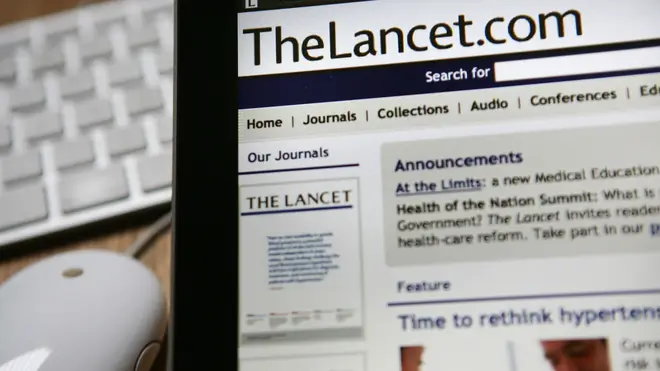
Paul Brand 7am - 10am
25 September 2021, 18:22 | Updated: 28 September 2021, 00:18

A prestigious medical journal has come under fire for using the phrase "bodies with vaginas".
A female Conservative MP described it as "dehumanising" while a psychologist branded it an "atrocity".
The journal published a paper in its "perspectives" section, entitled Periods on Display, and put a quote on its front cover which read: "Historically, the anatomy and physiology of bodies with vaginas have been neglected."
In the piece, which looks at literature, media and exhibitions focusing on menstruation, the text continues to say "for example, the paucity in understanding of endometriosis and the way women's pain has been seen as more likely to have an emotional or psychological cause, a hangover from centuries of theorising about hysteria".
It has drawn heavy criticism for using the phrase "bodies with vaginas" instead of "women".
Read more: Calling women 'birds' at work is sexist, tribunal rules
Read more: Men using 'mate' not the same as calling female colleagues 'love', tribunal rules
‘Bodies with vaginas’ I never see dehumanised descriptions of men. No wonder women feel diminished at the hands of medical professionals https://t.co/3zFLlW543j
— Jackie Doyle-Price (@JackieDP) September 24, 2021
Tory MP Jackie Doyle-Price tweeted: "'Bodies with vaginas' I never see dehumanised descriptions of men.
"No wonder women feel diminished at the hands of medical professionals."
Psychologist and author Dr Jessica Taylor said it was an "atrocity" and asked the Lancet "how you gonna play like you care that female bodies and female biology have been excluded from medicine and science WHEN YOU WONT NAME THEM?"
She tweeted: "I would like to hear @TheLancet explain their scientific rationale for keeping the use of the word 'men' 'male' and 'man' when they are refusing to use the word 'woman' 'women' and 'female'. Genuinely, I would like to hear that argument."
Dave Curtis, Honorary Professor at the UCL Genetics Institute and the Centre for Psychiatry, Queen Mary University of London, said: "How completely awful. Just wrote the Lancet to tell them to take me off their list of statistical reviewers and cancel my subscription and never contact me about anything ever again. Absolutely inexcusable language to refer to women and girls."
In response, Richard Horton, Editor-in-Chief at The Lancet, said: "I would like to thank all those who have responded to the words on this week’s Lancet cover and understand the strength of feeling it has provoked. The Lancet strives for maximum inclusivity of all people in its vision for advancing health. In this instance, we have conveyed the impression that we have dehumanised and marginalised women.
"Those who read The Lancet regularly will understand that this would never have been our intention. I apologise to our readers who were offended by the cover quote and the use of those same words in the review.
"At the same time, I want to emphasise that transgender health is an important dimension of modern health care, but one that remains neglected. Trans people regularly face stigma, discrimination, exclusion, and poor health, often experiencing difficulties accessing appropriate health care.
"The exhibition review from which The Lancet cover quote was taken is a compelling call to empower women, together with non-binary, trans, and intersex people who have experienced menstruation, and to address the myths and taboos that surround menstruation. The review, like the exhibition, puts these myths and taboos into historical context. The review calls for greater efforts to overcome the lack of knowledge and stigma too often associated with menstruation.
"These are serious issues that demand serious actions. We encourage people to read the full review and support a growing movement against menstrual shame and period poverty."